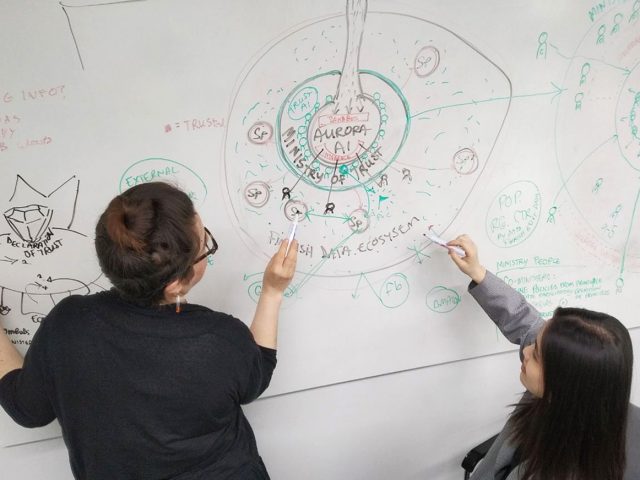This blog post reports on work-in-progress within the DfG course! The post is written by one of the two groups dealing with the Ministry of Finance’s brief on ‘Aurora AI: Empowering Citizens through Artificial Intelligence.’ The group includes Mia Aintila from the Language Specialist Program (English) at University of Turku, He Dian and Mirko Wittka from Aalto’s Creative Sustainability program, and Molly Balcom Raleigh from Aalto’s Collaborative and Industrial Design program.
Why do we have governments? To enable us to do things together that we can’t do by ourselves.
We’re entering a new era that economists are calling the Fourth Industrial Revolution, characterized by digitization, machine learning, and a fusion of physical and digital planes. In this context, we would do well to ask:
“What can the Finnish government do to manage these changes that individual people can’t do by themselves?”
We think Aurora AI is poised to lead on the answer: protect and grow Finland’s most important civic resource — trust.
- Trust between the Finnish people and their government, and among individuals and organizations, is the essential material of Finnish society.
- Transparency of the governance and economic systems of Finnish society is required to maintain and grow this trust through new technological advances.
- Literacy of how to interpret this transparency is required by people and organizations in order to make decisions about their own wellbeing and to participate in society.
AuroraAI can lead Finland through these transformations in an unprecedented way if the project can shift the paradigm of development from Human-Centred to Human-Driven.

Based on these premises as a result of our research, we started outlining a manifesto of principles that AuroraAI should be built on. This manifesto is meant to be the unifying vision that brings together the private- and public service providers within the Finnish data ecosystem. It thereby has to be informed by the people, which led us to pondering on the idea of a co-created Declaration of Trust at the heart of AuroraAI.
Words are not enough
Even though we see it as essential to give people a voice, mechanisms are required that make sure this voice is heard. We therefore kept ideating on new system structures, to make sure humans and what they want will drive the AI-enabled future.
The Declaration of Trust serves as the foundation of the continuous, responsive development of technology and service regulations. A new governmental entity, the People’s Authority of Trust, led by a council of experts from fields such as data privacy, AI, human-centred design, sociology, philosophy and ethics. The councillors are responsible for the participatory framework for the Declaration of Trust, and translate its principles into concrete policies and best-practices for the Finnish Data Ecosystem. This new authority will hold the technological means to monitor the Finnish data ecosystem and its services, alongside human agents to oversee those means.
AuroraAI will become the gateway for new services to enter the Finnish data ecosystem. As an incubator for new AI-enabled services, it will push forward the development of human-driven services within a network of private- and public institutions. Providing a sandbox environment, AuroraAI facilitates a barrier-free and fast process to validate a new service or product to be in harmony with the Declaration of Trust. Trainings and workshops on e.g. human-centred design as well as the importance of ethics in AI or data privacy accompany the development process. Once they successfully pass through this sandbox phase, a service provider can launch into the wider public of the data ecosystem.
Setting an Example
To demonstrate the viability of AuroraAI as a development environment and gatekeeper to a trust-building network of data service providers, the first official output will be a data management platform for Finland. It will function as the interface between the Finnish data ecosystem and its users. From here, people will be able to participate in the formulation of the Declaration of Trust as well as control their individual data for existing and new services. As an interactive platform, it will serve as a channel for education and feedback on the implications of open data and AI to create greater data literacy within Finnish society. And it will serve as the digital dashboard for the seamless service chain that will come about through this human-driven paradigm shift.
The DfG course runs for 14 weeks each spring – the 2019 course has now started and runs 26 Feb to 21 May. It’s an advanced studio course in which students work in multidisciplinary teams to address project briefs commissioned by governmental ministries in Finland. The course proceeds through the spring as a series of teaching modules in which various research and design methods are applied to addressing the project briefs. Blog posts are written by student groups, in which they share news, experiences and insights from within the course activities and their project development. More information here about the DfG 2019 project briefs. Hold the date for the public finale 09:00-12:00 on Tuesday 21 May!
